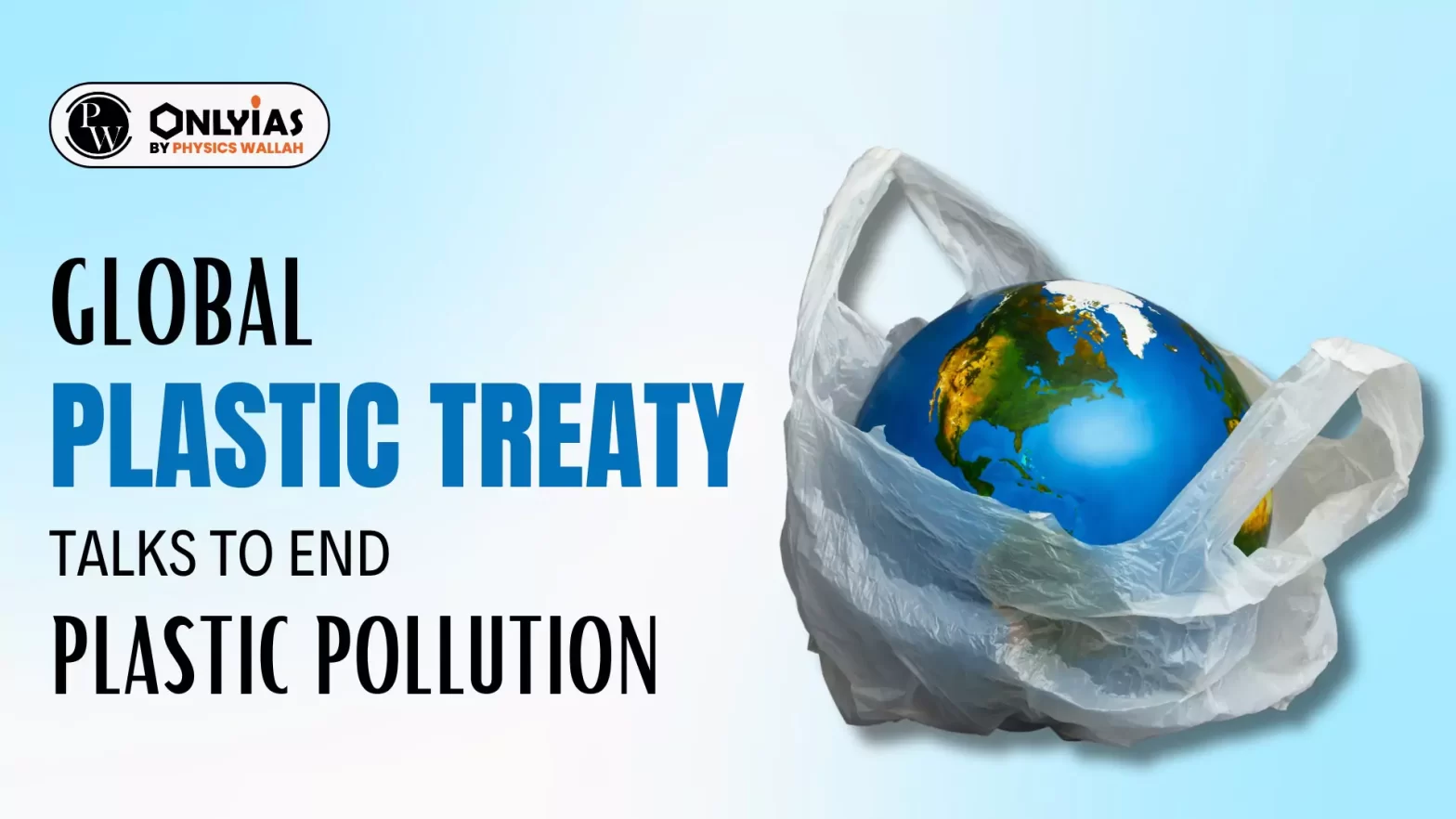Context
Global leaders will gather in Canada’s capital -Ottawa – to discuss progress in drafting a first-ever global plastic treaty to rein in soaring plastic pollution by the end of the year.
| Relevance For Prelims: Climate Change, UN Climate Summit 2023 or COP28, 2015 Paris Agreement on Climate, Carbon Emissions, High Ambition Coalition for Nature and people, Thousands More Chemicals In Plastics Than Estimated, 2024 Plastic Overshoot Day Report, Challenge Of Plastic In The Himalayas.
Relevance For Mains: Plastic Pollution, Marine Pollution, Single use Plastics, |
Enroll now for UPSC Online Course
Background of Global Plastic Treaty Talks
- Anticipated Climate Treaty: The hoped-for treaty, due to be agreed at the end of this year, could be the most significant deal relating to climate-warming emissions and environmental protection since the 2015 Paris Agreement.
- Tackling the Plastic Pollution Crisis: At the UN Environmental Assembly in 2022, the world’s nations agreed to develop a legally binding agreement by the end of 2024 to address the world’s plastic pollution crisis.
- Lifecycle Approach: The Global plastic treaty is meant to address plastics through their entire lifecycle – from when they are produced, to how they are used and then disposed of.
Problem with Plastics
- Source of pollution: Plastic waste has become a global menace polluting landscapes and waterways, producing plastics involves releasing greenhouse gas emissions.
- Contribution in global carbon emissions: The plastic industry now accounts for 5 percent of global carbon emissions, which could grow to 20 per cent by 2050 if current trends continue.
- Increased plastic production: Plastic production is on track to triple by 2060 – unless the treaty sets production limits, as some have proposed. Most virgin plastic is derived from petroleum.
Negotiation in Ottawa
- Prior Talks on Global Plastics Treaty: Countries have become divided on the issues during three previous rounds of talks – held in Punta del Este, Uruguay, Paris and most recently in Nairobi.
- Nairobi Talks: At the Nairobi talks, in November 2022, the draft treaty under review ballooned from 30 pages to 70 as some countries insisted on including their objections to more ambitious measures like production limits and phase-outs.
- Countdown to Compromise: Countries are now under pressure to find common ground before the final negotiations are held in December in Busan, South Korea.
Demand of Stakeholders
- Demands of a group of Like-Minded Countries: Many plastic and petrochemical-producing countries have opposed mentioning production limits.
- These countries include Saudi Arabia, Iran and China and are known collectively as the group of Like-Minded Countries.
- Demands of High-Ambition Coalition: The 60-nation High-Ambition Coalition, which includes EU countries, island nations, Japan and the UAE, wants to end plastic pollution by 2040.
- This coalition has called for common, legally binding provisions to restrain and reduce the production and consumption of primary plastic polymers to sustainable levels.
- They also are proposing measures such as phasing out problematic single-use plastics and banning certain chemical additives that could carry health risks.
- US’s Demands: The U.S. says it also wants to end plastic pollution by 2040. But unlike the High-Ambition Coalition, it wants countries to set their own plans for doing so, and to detail those plans in pledges sent regularly to the United Nations.
- Demand of Petrochemical Industries:
- Challenging Production Caps: The major petrochemical producers argue that production caps would lead to higher prices for consumers, and the treaty should address plastics only after they are made.
- Plastic Reuse and Recycling: These companies want to focus on encouraging the reuse or recycling of plastics, and on developing the market for burning plastics as fuel.
- Voluntary Chemical Disclosure: In terms of transparency about chemicals used in production, the group says companies should be allowed to disclose those chemicals voluntarily.
- Demand of Corporates:
- Business Coalition for a Global Plastics Treaty: More than 200 consumer-facing companies including Unilever, PepsiCo and Walmart have joined the so-called Business Coalition for a Plastics Treaty.
- Key Figures in Plastics Talks: Like the petrochemical industry, these companies that rely on plastic packaging for their products have been a major presence in the plastics negotiations.
- Advocating Comprehensive Treaty: But they support a treaty that includes production caps, use restrictions and phase-outs, reuse policies, product design requirements, extended producer responsibility, and waste management.
Enroll now for UPSC Online Classes
Conclusion
While some advocate for stringent measures like production limits and phase-outs, others emphasize voluntary approaches and post-production interventions. Bridging these divides will be crucial to forging a comprehensive treaty that effectively addresses the lifecycle of plastics.
Also Read: India’s Single Use Plastic Crisis
![]() 24 Apr 2024
24 Apr 2024
